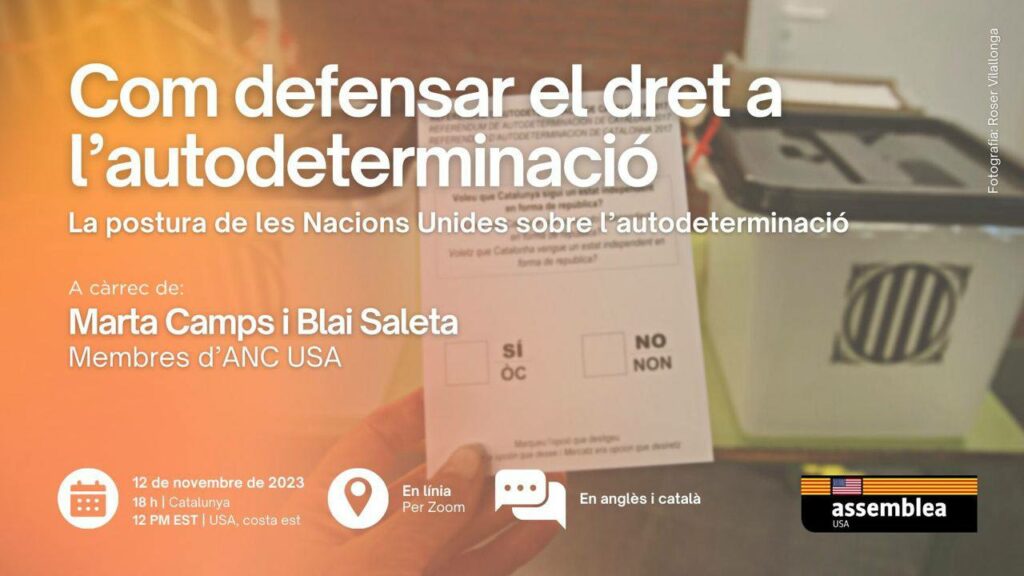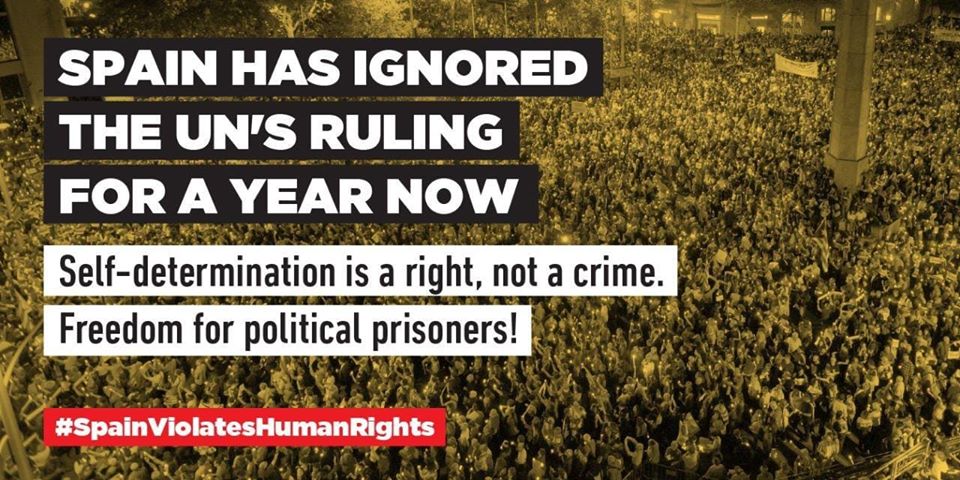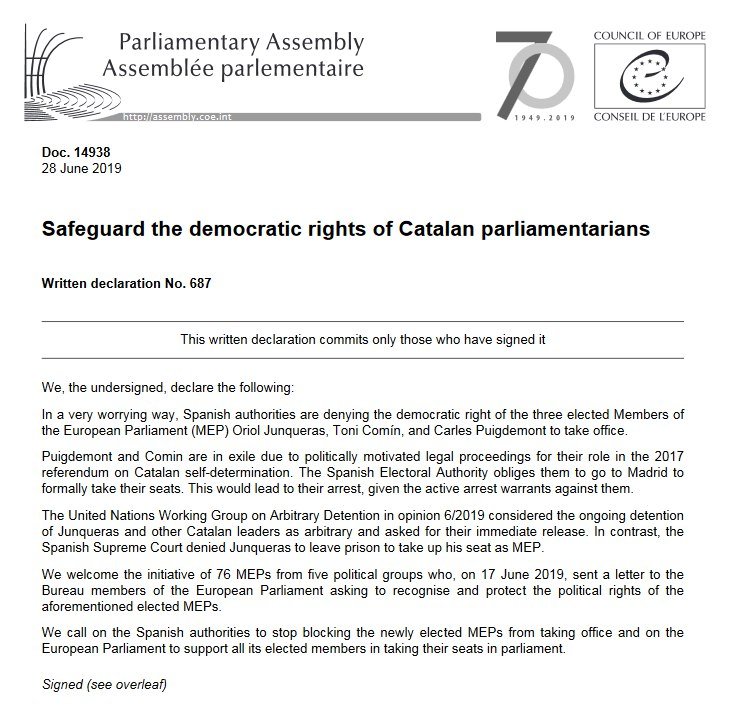The UN position on self-determination
Webinar by Marta Camps and Blai Saleta, members of the ANC USA
In Catalan
Join us on November 12th at 12 PM EST
https://us06web.zoom.us/j/89892246608?pwd=0Kxinxx4lmAcMTQDH6Y1tpX714CXJZ.1

Join us on November 12th at 12 PM EST
https://us06web.zoom.us/j/89892246608?pwd=0Kxinxx4lmAcMTQDH6Y1tpX714CXJZ.1

On March 8, the UN special rapporteur for minority issues expressed concerns about the restrictions and criminal charges against Catalan politicians and civil society activists involved in the October 2017 “referendum.” The special rapporteur called on the government to abide by its legal obligations to protect the human rights of minorities, including the Catalan minority, especially regarding the freedoms of expression; peaceful assembly, association; and participation in public life. The ombudsman rejected the categorization of the Catalan-speaking population as a minority. The special rapporteur agreed with conclusions of the Working Group on Arbitrary Detention that the extended detentions and subsequent convictions of Jordi Sanchez and Jordi Cuixart, the two civil society activists convicted in the case, as well as the other Catalan political leaders in prison, were to intimidate them because of their political views.
On May 13, Amnesty International criticized the Supreme Court’s interpretation of sedition as “excessively broad” and alleged it resulted in the “criminalization of acts of protest.” On November 3, it reiterated its call for the government to release Sanchez and Cuixart.
In July the UN Working Group on Arbitrary Detention reiterated its previous recommendation to release seven of the nine Catalan proindependence prisoners convicted of sedition by the Supreme Court for their role in the October 2017 “referendum” on Catalan independence. Representatives of several Catalan national political parties called those convicted “political prisoners,” but neither the government nor any international human rights NGO supported this claim.
The UN special rapporteur for minority issues expressed concern about the increase in Catalonia of hate speech against Catalans as a minority group in social and other media as a result of the protests following the October 2019 sentencing of 12 Catalan politicians and civil society activists. The special rapporteur also reported that politicians and others outside the region had begun to paint Catalans as traitors who had to be dealt with severely, at times using violent language. The national ombudsman rejected the categorization of the Catalan-speaking population as a minority.
2020 Country Reports on Human Rights Practices: Spain
The case goes beyond the purview of Spain’s Electoral Commission and is the umpteenth attempt by the Spanish authorities to suppress the Catalan national minority
Spain’s Supreme Court has confirmed the decision of the Spanish Higher Court of Justice in Catalonia to oust Catalan President Quim Torra for having hung a banner outside the Catalan government headquarters in support of Catalan political prisoners during the most recent election campaign. Three out of the five magistrates that issued the ruling were also members of the court in the 2019 trial against the Catalan pro-independence civic and political leaders. The removal of President Torra comes amid a dramatic increase of Covid 19 cases, leaving the Catalan people without the public health leader who has managed the pandemic regulations since its outbreak in early February.
The Catalan National Assembly denounces that President Torra’s ousting is yet another instance of the Spanish authorities’ abuse of the Catalan national minority, and of their disregard for international treaties such as the International Covenant on Civil and Political Rights. The Spanish authorities cannot go on demanding compliance with the rule of law while persecuting and imprisoning democratically elected representatives. Mr. Torra’s case is only one in a long list of Catalan elected leaders prosecuted by the Spanish justice system, a violation that must be recognized and amended.
In March 2020, the United Nations Rapporteur on minority issues, Fernand de Varennes, denounced that the judicial persecution of the Catalan pro-independence leaders, “aimed to intimidate them because of their political views”, and added that “Spain has a legal obligation to protect the rights of the Catalan minority, especially with regard to freedom of expression, including political expression, as well as freedom of assembly and association, fundamental rights and participation in public life.” His voice joined those of the Council of Europe, the United Nations Working Group on Arbitrary Detentions and organizations such as Amnesty International, Human Rights Watch and the International Commission of Jurists, among others.
The case began during the general election of April 2019, when the Spanish Electoral Commission considered that symbols of solidarity with Catalonia’s pro-independence leaders in jail—yellow ribbons and banners—displayed on government buildings infringed institutional neutrality. Despite the fact that these symbols had been on display since their imprisonment, they had not been a point of contention up until that time.
President Torra initially refused to remove them, on the basis that the symbols, which denounced the political imprisonment of the civil and political leaders, were within the bounds of freedom of speech. He added that hanging the symbols was a political act, and that therefore he was protected by his immunity as a Member of the Catalan Parliament. Even though he was eventually forced to remove the symbols, the Spanish public prosecutor pushed two lawsuits which ended in the ruling in December 2019 to oust Torra from office for 18 months and a fine of €30.000.
The Spanish Electoral Commission then asked for him to be immediately removed from his position. As a purely administrative body, the Commission had no right to make this demand and, in doing so, committed a breach of democratic guarantees. To remove the President is a right reserved to the Catalan Parliament. This kind of abusive behaviour was reminiscent of the trial against the nine Catalan civic and political leaders who organized a referendum and subsequently spent over two years in pre-trial detention and were sentenced to from 9 to 13 years amidst international outrage. In addition, one of the members of the Spanish Electoral Commission who took part in the decision was a legal expert who also worked for the Spanish nationalist party Ciudadanos, as was revealed afterwards.
In June 2020, the Spanish Supreme Court prohibited the display of ‘unofficial’ flags on public buildings, denying that the decision had anything to do with Mr. Torra’s case. Yet, its political intent relating to the Catalan pro-independence movement is clear. This decision also affects civil rights organizations and groups such as the LGBTI+ community, since the rainbow flag is not considered official.
One year after the UN demanded the release of Catalonia’s political prisoners, Spain keeps them in prison, systematically violating international law. We demand that Spain obeys the UN’s decision and for the right to self-determination to be respected.

A few days ahead of the sentences against the nine Catalan and political leaders in pre-trial detention since autumn 2017, Spanish authorities launch an operation to criminalize independentism and demobilise Catalan protesters.
On September the 23rd, nine Catalan activists were arrested by the Spanish police, accused of terrorism and rebellion without clear evidence. On September the 26th, seven of the accused were sent to pre-trial detention without bail. The operation has been called for by Spain’s National Court (Audiencia Nacional) in Madrid, direct heir of the Francoist Public Order Court.
These nine activists, whose crimes are to defend the right to self-determination of the Catalan people and who have not committed any crime, but who instead are accused of allegedly wanting to commit sabotage. Except for two cases, the home entrances and searches of the accused were performed without the presence of their legal representatives. Moreover, both the legal representatives of the accused and the local Members of the Bar Association (Col·legi d’Advocats) were kept in the dark for 48 h about the actual crimes the accused were charged for.
Two of the accused’s lawyers were forcefully replaced by state-appointed legal aid lawyer and in unsettling circumstances, their clients were interrogated uninterruptedly for 7 and 8 hours respectively during the early hours of September 24th-25th, without the statutory minimum period of rest. Details on the proceedings have been leaked to Spanish media outlets with the intention to create a negative initial image of the detainees, to which their lawyers still did not have access. The presumption of innocence has not been respected either. These circumstances are a blatant violation of the rights to defence of the detainees.
This is another attempt to intimidate and criminalize the Catalan pro-independence movement on the eve of the 2nd anniversary of the 1st of October 2017 referendum, which strategically coincides with the upcoming release of the sentences of the nine Catalan social and political leaders in prison. The court will most likely ask the highest penalty- up to 25 years of jail and 25 years of public representation ban- for calling for peaceful protests and exercising their prerogatives of calling for a referendum for the independence of Catalonia, (in October 2017) following the democratic will of the Catalan people, which provides steps towards achieving a Catalan state.
As with many other cases with the Spanish anti-terrorism law, there does not appear to be any true indications that violent actions were being planned, and Spain is again using criminal law to coerce the Catalan minority into not voicing their political opinions or exercising their right to protest.
In April 2018, the UN Special Rapporteur on freedom of opinion and expression urged the Spanish authorities to refrain from pursuing criminal charges of rebellion against political figures and protesters belonging to the Catalan minority involved in the independence referendum. In early 2019, the UN Special Rapporteur on minority issues stated, that “non-violent political dissent by minorities should not give rise to criminal charges” and joined “the concerns” of the UN Special Rapporteur on freedom of opinion and expression.
Against those warnings, in June this year, in its findings related to the trials of the Catalan independence leaders, the UN Working Group on Arbitrary Detentions stated “that the purpose of the criminal charge and the resulting trial is to coerce them on account of the political opinions they have expressed”, and called on the Spanish government for their immediate release.
The improper use of the anti-terrorism law and other high crimes has a chilling effect on public participation. Spain is again using criminal law to coerce the Catalan minority into not voicing their political opinions. Consequently, many Catalans are increasingly afraid to engage in public life.
The deterioration of the situation concerning civil and political rights in one EU member state is an issue that erodes the whole legitimacy of the European integration project, as it directly goes against one of its main foundations: the respect for democracy and fundamental rights. Therefore, it sets a dangerous precedent for all European Citizens.
The situation in Spain and EU institutions inaction also attacks the credibility of the European Union as a democratic project, and therefore its capacity to project influence overseas.
Spain’s “justice” as an example for Erdogan’s Turkey to justify itself of committing human rights abuse. It is time for Europe to stand against Spain’s persecution of Catalan leaders for crimes they didn’t commit. The Catalan case is an opportunity for Europe to show the world how to solve political issues through politics and Democracy. Otherwise, criticism against non-EU countries doing the exact same thing is just hypocrisy.
‘Mr Soylu linked the removal and prosecution of the elected officials to Spain’s moves against elected Basque and Catalan elected officials who became part of separatist movements.
“Although there is no violent act, 12 Catalan officials were prosecuted for crimes of destroying constitutional order through violence and disobedience,” he said.’
Source: https://www.independent.co.uk/news/world/europe/kurdish-mayors-removed-turkey-suleyman-soylu-ekrem-imamoglu-a9073466.html
⬛️⬜️ Spanish Minister of Foreign Affairs Josep Borrell will be the new EU High Representative for Foreign Affairs.
We would like to bid farewell to Mr Borrell, so we have collected a bit of his “record”.
Catalans are delighted to say Farewell Borrell, but is he really the best choice for the EU? There’s still time to #StopBorrell
⬛️⬜️🇪🇺 23 members of the Parliamentary Assembly of the Council of Europe (@coe / Strasbourg) have signed a Written declaration demanding to ‘safeguard the democratic rights of Catalan parliamentarians’.
http://assembly.coe.int/nw/xml/XRef/Xref-XML2HTML-en.asp?fileid=28072&lang=en

“75 years ago the Normandy landings turned the tide of World War II thanks to the efforts of a Barcelona-born spy who the British knew as ‘Garbo’ ”
‘In fact, the reason Pujol was in Normandy 35 years ago, four years before his death, was part of the recognition the British authorities finally awarded him for his spying work as a double agent deceiving Nazi Germany about the Allies’ true intentions in 1944.
Pujol is better known by his codename “Garbo,” after the famous Hollywood starlet of the time Greta Garbo (he was “Alaric” to his German handlers), but when he first offered his spying services to British military intelligence he was turned down, three times.’
‘So successful was Garbo’s manipulation of both fake and real information that the Germans ended up financing a network of 27 fictitious agents, and even stopped recruiting spies in the UK. In fact, Pujol was awarded the Iron Cross for his “services” to the German war effort.’
‘For his effectiveness and loyalty, the British made Garbo a Member of the Order of the British Empire (MBE), and when the Allies began preparing for D-Day, which would see an invasion force of 160,000 landing in Normandy, they turned to Pujol for help.’
‘While the Germans had got wind of the plans for Operation Overlord being commemorated this week, Garbo distracted them with Operation Fortitude, a deception campaign in which the Catalan spy convinced the Nazis that the main attack would be at Pas de Calais.
Garbo got to work, sending the Germans over 500 radio messages between January 1944 and D-Day. That split the German forces and prevented them from reinforcing their defences in Normandy where the actual invasion was set to take place.’
‘After the war, Garbo avoided Nazi reprisals by faking his death and moving to Venezuela, where he ran a small business. It was only thanks to detective work done by a former British politician and writer, Rupert Allason, that the world was reacquainted with this unlikely hero.’
‘Pujol’s legend lived on and his story was told in a 2009 film called Garbo: The Spy. As the world commemorates the efforts of thousands of soldiers on Thursday, one hopes a thought will be spared for a Barcelona poultry farmer who was key in bringing down Hitler’s regime.’
Extracts from article: http://www.catalannews.com/culture/item/the-catalan-who-made-d-day-possible
The following are some examples of the assertions the Spanish Prosecutor made on his closing statement during the Trial against Catalan political prisoners:
‘Those who offered resistance are responsible for all the violence’
‘Not only using physical energy implies violence, also resisting’
‘What happened in Catalonia between March 2015 and October 2017 is what in the terminology of the jurist Hans Kelsen is called a coup d’état’
‘Holding a referendum is a crime even if it has been decriminalized’
After reading all these statements, it’s shamefully obvious the Prosecutor not only doesn’t understand anything about civil resistance, and the Theory of Passive resistance or non-violent campaigning, he doesn’t even know that there’s a Criminal Law principle that says ‘Nullum crimen, nulla poena sine praevia lege’. This is the legality principle for which a person cannot face criminal punishment except for an act that was criminalized by law before he/she performed the act. This is a disgraceful mock of Justice and of what should be an actual Trial.
#ThisIsNotATrialItsAFarce
#Shame
#FreeCatalanPoliticalPrisonersAndExiles